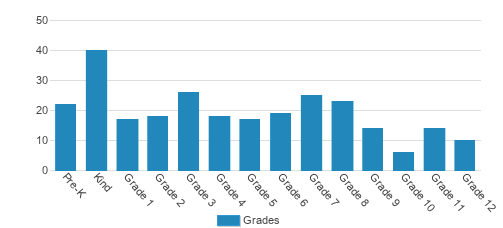Haleakala Waldorf School strives through the arts to help Maui's children reach their potential by fostering a love of learning and by developing their intellectual, emotional, physical, and spiritual capacities.
Developed by Rudolf Steiner in 1919, Waldorf education is based on a developmental approach that addresses the needs of the growing child.
Waldorf teachers strive to transform education into an art that educates the whole child---the heart and the hands, as well as the head.
Waldorf Education approaches all aspects of schooling in a unique and comprehensive way.
The curriculum is designed to meet the various stages of child development, and Waldorf teachers are dedicated to creating a genuine inner enthusiasm for learning, that is essential for educational success.
Quick Stats (2025)
- Top Ranked HI School
- Grades: Prekindergarten-12
- Enrollment: 656 students
- Yearly Tuition: $13,900
- Acceptance rate: 51%
- Average class size: 25 students
- Application Deadline: Feb. 16 / Apr. 1 / rolling
- Source: Verified school update
Top Rankings
Haleakala Waldorf School ranks among the top 20% of private schools in Hawaii for:
Category
Attribute
Acceptance Rate
Student Body
Extracurriculars
School Overview
Religious Affiliation
Grades Offered
Grades Prekindergarten-12
Year Founded
1972
School Calendar
Student Body
Total Students
656 students
Student Body Type
Co-ed
% Students of Color
7%
State avg.: 72%
Students by Grade

Academics and Faculty
Total Classroom Teachers
31 teachers
Student : Teacher Ratio
21:1
National avg.: 13:1
Average Class Size
25 students
Classroom Dress Code
Casual
Tuition and Acceptance Rate
Admission Deadline
Feb. 16 / Apr. 1 / rolling
Yearly Tuition Cost
$13,900
Tuition Notes
19,700 grades 9-12
18,000 grades 6-8
17,300 grades 1-5
13,700 FT PS and 15,400 FT KG
% on Financial Aid
28%
Average Financial Aid Grant
$4,100
Acceptance Rate
51%
National avg.: 85%
Admissions Director
Hileka Lyons
Sports
Total Sports Offered
5 sports
Extracurriculars
Total ExtracurricularsTotal Extra-curric.
34 extracurriculars
ExtracurricularsExtra-curric.
Club or Organization:
art club, Book Club, Music Club, Ping Pong Club, Social Acceptance Club
Arts and Music Programs:
Acrylics, Calligraphy, Ceramics, Choir, Drama, Drawing, Illustration, Jewelry Making, Lost Wax Jewelry Making, Mask-Making, Mixed Media, Music History, Oils, Pastels, Pottery, Print Making, Sculpture, Watercolor Painting
Recreational Athletic Programs:
Basketball, Beach Volleyball, Bicycling, Cross Country, Mountain Biking, Paddling, Surfing, Tennis, volleyball, Windsurfing, Yoga
art club, Book Club, Music Club, Ping Pong Club, Social Acceptance Club
Arts and Music Programs:
Acrylics, Calligraphy, Ceramics, Choir, Drama, Drawing, Illustration, Jewelry Making, Lost Wax Jewelry Making, Mask-Making, Mixed Media, Music History, Oils, Pastels, Pottery, Print Making, Sculpture, Watercolor Painting
Recreational Athletic Programs:
Basketball, Beach Volleyball, Bicycling, Cross Country, Mountain Biking, Paddling, Surfing, Tennis, volleyball, Windsurfing, Yoga
Source: Verified school update
Frequently Asked Questions
How much does Haleakala Waldorf School cost?
Haleakala Waldorf School's tuition is approximately $13,900 for private students.
What is the acceptance rate of Haleakala Waldorf School?
The acceptance rate of Haleakala Waldorf School is 51%, which is lower than the national average of 81%. Haleakala Waldorf School's acceptance rate is ranked among the top private schools in Hawaii with low acceptance rates.
What sports does Haleakala Waldorf School offer?
Haleakala Waldorf School offers 5 interscholastic sports: Basketball, Cross Country, Surf Team, Track and Field and Volleyball.
What is Haleakala Waldorf School's ranking?
Haleakala Waldorf School ranks among the top 20% of private schools in Hawaii for: Lowest average acceptance rates, Largest student body and Most extracurriculars offered.
When is the application deadline for Haleakala Waldorf School?
The application deadline for Haleakala Waldorf School is Feb. 16 / Apr. 1 / rolling (applications are due on Feb. 16 / Apr. 1 but additional applications are reviewed year-round as space permits ).
School Reviews
Endorse Haleakala Waldorf School. Endorsements should be a few sentences in length. Please include any comments on:
- Quality of academic programs, teachers, and facilities
- Availability of music, art, sports and other extracurricular activities
- Academic or athletic awards
Recent Articles

A Parent's Guide To Understanding High School Teaching Methods
This comprehensive guide helps parents navigate the various teaching methods used in today's high school classrooms. By understanding these approaches, you'll be better equipped to support your teen's learning journey, communicate effectively with teachers, and create a complementary learning environment at home.

February 08, 2025
Social Emotional Learning: Education's Hidden SymphonyA musician's perspective on Social Emotional Learning reveals how this educational framework orchestrates success through five essential emotional competencies.

January 24, 2025
A Roadmap For Starting A Private SchoolUse this roadmap as a set of talking points with your trusted mentors and professionals to start the private school of your dreams. You're not alone. Over the years, hundreds of folks like you have had the same dream. From Quintilian to Maria Montessori to Lucy Madeira Wing, visionary educators have established schools to teach according to their beliefs and methodologies.





















